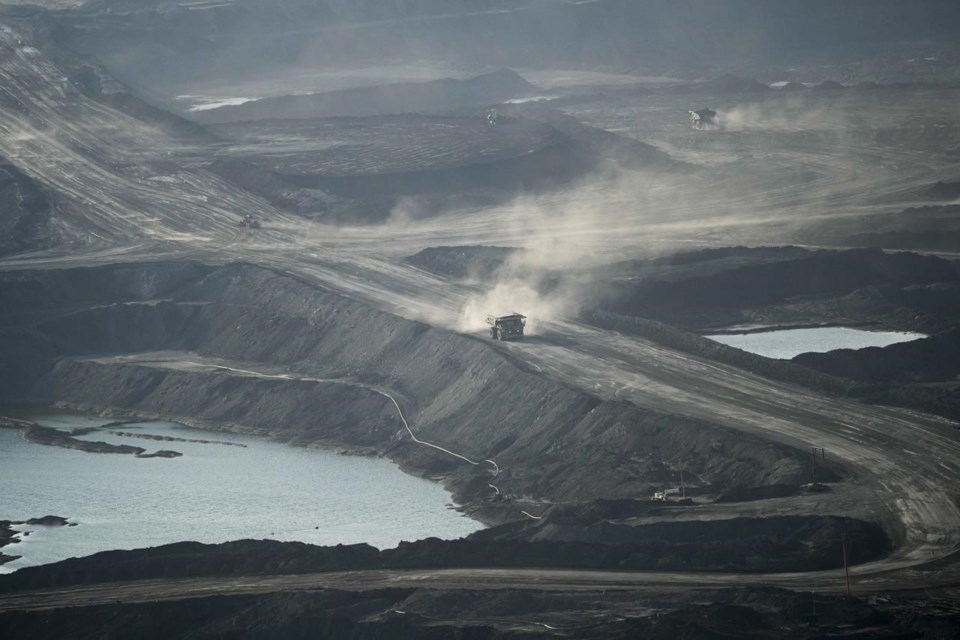CALGARY — Suncor Energy Inc. says it is leasing and operating a number of Aframax oil tanker ships to carry crude from the recently completed Trans Mountain pipeline expansion to Pacific markets.
By leasing and operating the tankers itself, Suncor saves on shipping costs, said Dave Oldreive, the company's executive vice-president responsible for refining, sales and marketing.
"We’re well-positioned to deliver volumes to our customers and remove that middleman and capture the full value for Suncor," Oldrieve said on a conference call with analysts on Wednesday, during which executives discussed the company's first-quarter financial results.
The Trans Mountain pipeline expansion, which runs from Alberta to the B.C. coast and marked its official opening last week, gives Canadian oil shippers access to an additional 590,000 barrels-per-day of pipeline capacity.
The expanded pipeline will "clearly increase" the profitability of Suncor's oilsands production, Oldreive said, by reducing the discount Canadian oil shippers have historically received for their product in part due to a lack of export capacity.
It also enables future production growth, both for Suncor and the oilsands sector as a whole, he added.
"We’ve been waiting for this for some period of time, and we’re excited to start shipping on the pipeline. It’s good for our industry, it’s good for Suncor," Oldreive said.
According to numbers provided by the Canada Energy Regulator, the Trans Mountain pipeline expansion is expected to boost total western Canadian crude oil export capacity by 13 per cent once fully in service. (While officially open, the pipeline is still filling with crude, and the first tanker ship is not expected to load from the new line for export until the middle of the month.)
Overall, the capacity of the Trans Mountain expansion will represent 17 per cent of the total pipeline export capacity available to Canadian crude oil shippers, according to the Canada Energy Regulator.
Oldrieve said on Wednesday's call that Suncor expects the crude oil loaded off the Trans Mountain pipeline onto tanker ships at the Westridge Marine Terminal in Burnaby, B.C., will be delivered primarily into California as well as Asian markets.
He said Suncor's trading offices in Calgary, Houston and London, England have been working to strengthen relationships with customers along the West Coast and in Asia to capitalize on the opening of the Trans Mountain project.
"We’ve got a pretty sophisticated trading platform. And what might make us a bit unique is we’re not reliant on third-party trading shops," Oldrieve said.
"This allows us to capture the full value of the transaction by transacting directly with customers."
Eighty per cent of the Trans Mountain pipeline expansion's capacity is tied to long-term contracts with crude oil shippers, leaving the remaining 20 per cent available for spot shipments on a month-to-month basis.
Contracted oil shippers, including Suncor, are currently locked in an ongoing dispute with Trans Mountain Corp. over the rising tolls the Crown corporation wants to charge them to move their product on the pipeline.
The start-up of Trans Mountain is coinciding with increased output from Western Canadian oil companies. In Alberta specifically, oil output hit record-high production of 4.53 million barrels per day in December 2023, Canada Energy Regulator figures show.
Suncor itself said in a news release after the close of markets Tuesday that it earned $1.61 billion in the first three months of 2024, down from $2.05 billion a year earlier.
The company reported record upstream production of 835,000 barrels per day during the quarter, including all-time high oilsands production of 785,000 barrels per day.
The company also said it achieved record refined product sales of 581,000 barrels per day, and saw its highest-ever first quarter refining throughput at 455,000 barrels per day with 98 per cent overall refinery utilization.
Suncor has scheduled a presentation for investors on May 21, when it has said it will provide an update on progress made by the company to lower its costs and increase shareholder returns.
CEO Rich Kruger, who was brought in to lead the energy giant amid growing investor pressure for the company to improve its safety record and operational performance, has now been at the helm for just over a year.
This report by The Canadian Press was first published May 8, 2024.
Companies in this story: (TSX:SU)
Amanda Stephenson, The Canadian Press




